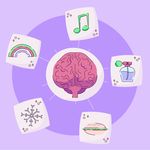Elaborative Rehearsal: The Secret to Long-Term Memory
May 24, 2024 by Vreny Blanco · 5 min read · Focus

Elaborative rehearsal is a powerful memory enhancement technique that involves linking new information to what you already know. This method not only helps you retain information in long-term memory, but also deepens your understanding by integrating new data with previously acquired knowledge.
In this blog post, you’ll discover how this method goes beyond simple repetition to deepen your understanding, and solidify knowledge in your long-term memory. We’ll define elaborative rehearsal, distinguish it from maintenance rehearsal, and discuss its many benefits.
You’ll also learn practical strategies for applying this technique to various aspects of your life, from academic learning and professional training to everyday memory tasks.
What is Elaborative Rehearsal?
According to the APA Dictionary of Psychology, elaborative rehearsal is an encoding strategy that enhances memory formation by connecting new information to your existing knowledge base.
The Difference Between Elaborative and Maintenance Rehearsal
While both elaborative and maintenance rehearsal involve repetition, their approaches and outcomes differ significantly. Maintenance rehearsal focuses on the temporary retention of information through continuous repetition, without deeper understanding or connection to other knowledge.
In contrast, elaborative rehearsal enriches information by linking it to existing memories, thereby embedding it more permanently in your long-term memory.
Benefits of Elaborative Rehearsal
The primary benefit of elaborative rehearsal is its ability to transfer information from short-term to long-term memory, ensuring that knowledge is retained over time. This method not only improves your memory recall but also enhances your ability to apply knowledge in different contexts, supporting critical thinking and problem-solving skills.
How It Works
- Make a list of the new concepts or ideas you need to learn.
- Go through the list and ask yourself questions about how these ideas work and why. Pretend that you are creating a test.
- Make connections between the different new concepts or ideas you need to learn and explain how the ideas work together. A good way to do this is to take two concepts and think about how they are similar and how they are different.
- Describe how the concepts you are studying apply to your own life experiences or memories. As you go about your day, notice things happening around you and make connections to the ideas you are learning in class.
- Describe and explain the ideas you are learning in your own words, using your own examples.

Strategies for Effective Elaborative Rehearsal
You can implement elaborative rehearsal through several strategies that enhance the encoding of information:
Meaningful Repetition
Instead of merely repeating information, relate it to something you already know or find a way to make it meaningful. For instance, if you’re learning a new scientific term, think about how it relates to an experiment or concept you are familiar with.
Linking Examples
Connect new concepts with familiar examples to aid your understanding and memory. If you’re studying economics, relate the concept of supply and demand to your shopping experiences during holiday sales.
Visualization
Create mental images or associate new data with visual cues to improve recall. Visualizing the steps in a process can help you remember them more easily than text alone.
Using Mnemonics
Develop mnemonics to help you remember lists or complex information. These can include acronyms, rhymes, or songs.
Teaching
Explain the material to someone else or apply it to real-world scenarios. Teaching concepts to others is a powerful way to reinforce your own understanding and memory.
Practical Applications
Elaborative rehearsal has practical applications in everyday learning scenarios:
Academic Learning
You can significantly improve your learning process by using elaborative rehearsal. By linking complex academic theories to real-life examples or familiar concepts, you can deepen your understanding and make exam preparation more efficient.
Professional Training
In professional environments, elaborative rehearsal is invaluable for mastering job-specific knowledge and skills. You can anchor new procedures or product details to similar past experiences, enhancing recall and proficiency.
Daily Life
Elaborative rehearsal also enhances everyday memory tasks, from remembering names at social events to managing a grocery list. By forming associations between new acquaintances’ names and familiar faces, or linking grocery items with meal plans, you can significantly improve your recall abilities.
Who Can Benefit from Elaborative Rehearsal?
Elaborative rehearsal is universally beneficial and not limited to specific groups. It helps everyone, from teachers, students, and doctors to parents, in both professional and personal contexts. Whether it’s remembering recipes or directions, elaborative rehearsal improves the retention of important details.
It is particularly beneficial for people with learning disabilities such as dyslexia, offering adaptable methods to suit their learning styles. It also helps people in the early stages of dementia maintain routines and remember familiar faces and places.
People with ADHD or anxiety, as well as anyone who needs extra help with memorization tasks, also find elaborative rehearsal helpful in managing daily interactions and responsibilities.
Conclusion
Elaborative rehearsal is a great way to improve your memory. It helps you connect new information to what you already know, so you can remember it better and learn more easily. This technique is beneficial for students, professionals, and anyone who wants to enhance their memory.
What’s Next?
Want to learn more techniques to improve your memory? Read our article How to Improve Your Memory: Techniques for Cognitive Boost



